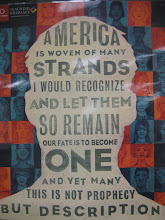Anyon’s text was a refreshing read, and it was an excellent catalyst for forming connections among the texts I’ve read and courses I’ve taken for the Master’s in Urban Ed. It is becoming quite evident that a collaboration of educational stakeholders is essential if America is to realize any sort of educational reform. On what specific mission do stakeholders collaborate, though? Whereas Anyon said the larger needs of a community must be addressed before the particulars of education can be remedied, Noguera (2003) determined that it’s the quality of our schools that will determine the future of our society (p. 157). Regardless of this pseudo which came first riddle, Anyon’s point that middle and high school teachers can make a significant impact by encouraging students to participate in civic activism was an essential one. This implies, though, that not only will teachers “step up” but also that students will find themselves worthy of their own—and others’—efforts. Many teachers are unfortunately not likely to find an incentive in taking on the charge of a new social movement, but the importance of teens and educators working together will both help teens see that they are worth a quality education and help develop trust between student and teacher. Once this trust begins building, the possibilities for dialogue and change are endless. Anyon remarked that teachers need to consistently—and publicly—assert the potential and abilities inherent in minority students while also explaining to minorities how to negotiate around the predominantly White culture of power. I can’t imagine this conversation going well if there isn’t a significant amount of trust among educators and students. Further, it is vital that educators to develop trust among community members; however, there may be a catch: We have talked in class about a bitterness directed toward White teachers who, albeit well-intentioned, come into the neighborhoods of their students trying to build relationships; is it not possible that even the best intentions of educators will be met with resistance from minority community members? How will this trust begin to take shape?
What’s frustrating is that I don’t see an end to America’s societal “us”/ “them” dichotomy. There will always be “haves” and “have nots.” (For that matter, consider the experiment conducted in Aldous Huxley’s fictional Brave New World; when a group of the high-achieving Alphas were put on an island together they destroyed each other. Although a satirical commentary on society, Huxley does highlight some truth: Society cannot function if there are no followers to the leaders.) So what is most important to America’s future? Stone, et al. (2001) said that “the global economy shows no mercy to individuals who lack basic skills” (p. 11), yet Anyon noted that even with an increase in skilled workers, poverty persists. Where does that leave education? Anyon referenced Doug McAdam in her text, and he observed that belonging to a social group makes it more likely that an individual will participate in “contentious politics.” Perhaps the key is not in leveling the playing field, per se, but rather in encouraging members of any social group—regardless of race or class or religion—to develop pride and confidence; perhaps these are the true determinants of social capital.
Anyon, J. (2005). Radical Possibilities. New York: Routledge.
Subscribe to:
Post Comments (Atom)

No comments:
Post a Comment